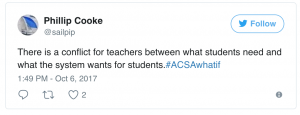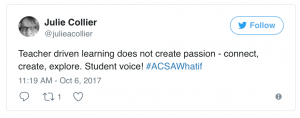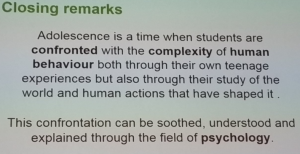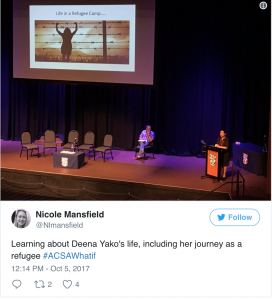2017 ACSA Conference
WHAT IF? Embracing complexity through curriculum innovation
Program: https://www.acsaconference.acsa.edu.au/program

Source: http://didimissanythingyesterday.blogspot.com.au/2015/06/top-tenish-takeaways-from-2014-2015.html
Part 3
There is a constant tension between the curriculum as constructed and the curriculum in practice. While politicians and the media carry on about how Australia goes in world rankings in education and schools performing or underperforming in NAPLAN and other state enforced testing, schools and their teachers need to focus on real learning.
However, many institutions and people believe a move away from teaching to the test involves acute risks, for example, in the forms of parent backlash and reduced government funding. One conference delegate from a prestigious private school in Melbourne told me she had no desire to change her teacher-centred approach to learning because she was achieving great marks from her students and they were learning the set curriculum as intended. This was her job, not worrying about the skills and attributes students may need for actual life. Yes, that comment is a bit harsh, but illustrates how I feel. I understand where she is coming from, particularly considering the pressure for marks, but I don’t agree with the approach all the same.
So how can schools shift the traditional view of education being about the accumulation of knowledge to more genuine authentic learning appropriate for our modern world and heading into the future?
Reclaiming the Curriculum – Implementing Change
At the conference I attended sessions relating the journeys of two different schools: Parramatta Marist High School with Gavin Hays (slides) and Campbelltown Performing Arts High School (CPAHS) with Stacey Quince, the Principal.
The message that most clearly struck home, for me, is that communication with all stakeholders about the need for change is vital, particularly with parents. The Futures Unit of the NSW Department of Education has produced a case for change in this video:
Schools need to be clear about the reasons for changing the style of learning within their schools. These reasons include:
- Student engagement in learning
- Preparing students for a modern world of globalisation and technology driven change
- Providing students with the skills to enter university eg interview skills for early-entry
On the front page of their website, CPAHS is upfront about their learning approaches, summarised in this video:
The biggest contrast between these two schools is their pedagogy. Parramatta Marist is a completely dedicated PBL (Project Based Learning) school where students undertake 200 projects during their time at high school. On the other hand, CPAHS advocates a range of pedagogical approaches, including PBL, design thinking and explicit instruction. As I’ve said before, I’m all about balance, so prefer a horses for courses approach.
Other than that, the schools were quite similar in how they implemented change. At the core of change is a focus on learning and the skills required for the world today. Assessment is then aligned with these skills. Other changes include reducing timetable restrictions, adjusting the physical environment to allow for more collaborative learning and making stronger connections to the community. On that last point, I have deep admiration for how CPAHS has worked with their local council to solve various issues in their area. For instance, Year 8 students participated in a PBL with a design thinking process to consider How can we improve community engagement and sustainable use of a local wetland area? To quote the council’s Comprehensive State Of The Environment Report: Major Achievements July 2012 – June 2016:
Students from Campbelltown Performing Arts High School investigated environmental and social issues surrounding the Park Central wetland and developed a suite of management actions aimed to improve the local environment, increase awareness about the wetland and engage local residents with the space. As a result, Council has implemented two of the student’s ideas; a children’s storybook ‘Eric the Eel’ and a wildlife tile game. Both projects aim to raise awareness of the unique plants and animals at our local parks. (Campbelltown City Council n.d., p.21)
As a consequence of these implemented changes, CPAHS students are gaining early university entry because they can articulate what they’ve done at school and why it matters.
TeachMeet
Although technology prevented a visual and coherent presentation (hyperlink to slides) from Bronwyn Joyce, my interest was piqued enough to investigate further. She is a strong advocate for integrating the UN Sustainable Global Goals into the classroom and some amazing #OneWorldOneClassroom activities can be found here. Click on the presentation slides to gain free temporary access.
Svetlana, a pre-service teacher, presented about the importance of psychology in teaching. It resonated with the audience:
Yaso showed a video about the curriculum changes being made at her school:
Leanne Cameron talked about AI and robots taking over the workplace, or not. See Students teach to avatars in classrooms of the future, AI tutors and meet Amelia and Jill.
Chatbots don’t need to seem “human”, they just have to be useful.
Annie Gerasimou promoted Club Kidpreneur which I loved the sound of because it has a Market Day that focuses on real world problems instead of food and drink, but then I found out it was outsourced to a commercial enterprise. A little disappointing.
Other Presenters/Events
Deena Yako shared her life story and how schools can connect with their local immigrant community. In brief she:
- Fled Iraq as a child, went through refugee camps
- Entered Year 8 after 3 terms of English lessons
- Had high hopes for HSC but bombed it
- Through TAFE ended up with job in the settlement of Iraqi refugees in Australia – educating school communities and others about refugee experience, empowering refugees to be their own advocates and contribute back to society – they want to, but many hurdles
Read more about what she has achieved:
- How a sewing circle brought hope to Sydney’s Iraqi community
- The Sydney school that’s opened its doors to refugee Mums and Dads
Scott Eacott, Director, Office of Educational Leadership, University of NSW
Final comments
I loved this conference for its mix of teachers and academics across Australia and that a handful of these people were the tribe I know and love from TeachMeets, conferences and Twitter. Cameron organised the conference and Yaso organised the TeachMeet. I hung out with Stephy, John, Darcy, Phil and Nigel who were also presenters. I connected with my MEd idols Alan Reid and Bob Lingard. I met Omar Musa and saw him perform!
I also loved the new connections I made with a bunch of academics who want to cross the university/school divide and encouraged me in the my own pursuit of academic research. I want to research how to encourage teachers to adapt their pedagogy to make learning the focus instead of high stakes testing taking precedence, by reducing the risks they perceive.
You can’t take home the whole beach, just bits of driftwood.
At the TeachMeet, Cameron shared the above adage, he once heard from a colleague. Well, the driftwood I’ve brought home from this conference is pretty darn special.









Sharni
Your 3 post are a great summary of the 3 days.
Thanks
Shani, I loved reading this three post sequence detailing your takeaways from the ACSA Conference. I wanted to be there, but couldn’t make it. You’ve given me a wonderful overview with many links to follow. I will be sharing these posts with colleagues from my school. Thank you so much.
Jenny.
Thanks Jenny. I still come across things I didn’t include, like the THINK Global School: https://thinkglobalschool.org
You should also read this more succinct and eloquent post by Nigel Coutts: http://thelearnersway.net/ideas/2017/10/8/what-if-reflections-from-the-acsa-conference